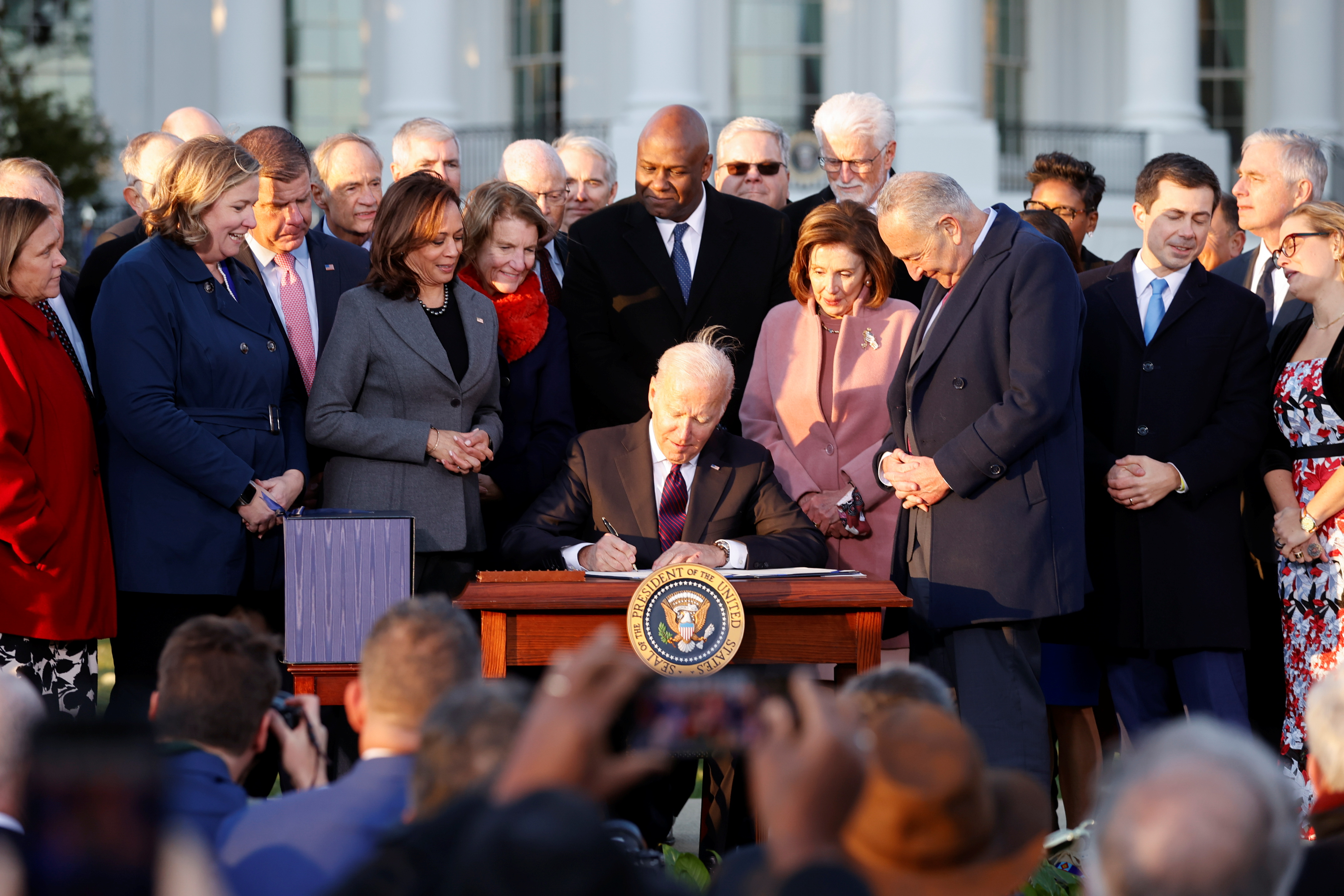Most Americans Don't Know About President Biden's Historic Infrastructure Law. That's a Problem.
With all the deservedly negative coverage of Donald Trump, MAGA Republicans, and their pet Supreme Court, it has been hard for most Americans to hear about the positive developments that have taken place since January 2021. 63 percent of Americans believe Joe Biden has done little since he took office, when the fact is that this Congress has been the most productive in modern history. There was the slew of executive actions that Biden took on day one to undo the Trump administration's worst policies; the actions the DOJ and the White House took to meet the moment on racial justice; the American Rescue Plan Act that vaccinated 80 percent of Americans and created ten million jobs in less than two years; the designation of Juneteenth as the first new national holiday in 40 years and the signing of two historic hate crimes laws, one of which was a response to COVID hate crimes and one of which was the anti-lynching law a century in the making; the biggest reform to the US Postal Service in nearly half a century; the restoration and strengthening of the Violence Against Women Act; the Honoring Our PACT Act that provided millions of veterans healthcare they have waited for for decades; the end of the Wars in Afghanistan and Iraq and the killing of the leaders of both ISIS and al-Qaeda; the CHIPS and Science Act that led America to outpace China for the first time in modern history and led an American manufacturing boom; the appointment of Ketanji Brown Jackson to the Supreme Court as well as an unprecedented rate of diverse, qualified, progressive judges appointed to other federal courts; the Inflation Reduction Act that reduced the deficit, made the largest investment in fighting climate change in U.S. history, and lowered the cost of healthcare and prescription drugs; the Kigali Amendment and other actions to fight climate change; legislation combatting sexual assault and harassment as well as human trafficking by making landmark reforms; the cancellation of student debt; the passage of the first gun safety bill in decades matched with more executive action on the issue than any president in history; the American leadership in the global response to the Russian invasion of Ukraine; unprecedented funding to cure cancer and other deadly diseases; and too much more to list.
Missing from that list is one of the most historically popular issues in American society: infrastructure. The Infrastructure Investment and Jobs Act is the largest and most comprehensive single investment in infrastructure in U.S. history and one whose impact will be on par with Dwight D. Eisenhower's creation of the Interstate Highway System in the 1950s. The $1.2 trillion law will create an estimated two million jobs; secure universal broadband by 2030; create a nationwide electric vehicle charging network and invest tens of billions of dollars in other clean energy technology; invest hundreds of billions of dollars to repair failing roads, highways, and bridges; restore American excellence in ports and airports; make the largest clean water investment in U.S. history and help phase out lead pipes and paint; make the largest investment in rail since the creation of Amtrak; invest tens of billions of dollars to clean up contaminated sites (including nearly every single one here in the Great Lakes) and restore ecosystems around the country; and much more. Americans overwhelmingly support these provisions individually and the law as a whole.
The problem is that nearly 75 percent of Americans-- including the majorities of Republicans, Independents, and Democrats-- don't know about the law at all. Because of the negotiations over what would become the Inflation Reduction Act in the second half of 2021, relatively few Americans even heard about the Infrastructure Investment and Jobs Act being signed into law on November 15th, 2021, nearly a year ago. Most think the bill is still pending in Congress. Even in Democratic circles, I have come across statements too often, particularly revolving around the Jackson Water Crisis, describing how Democrats "tried" to pass a major infrastructure law last year, seemingly unaware that the historic legislation became law and, more broadly among independent circles, wondering why Congress doesn't act to fix American infrastructure. The problem is that, every day for the past year and for years to come, numerous major projects are being launched around the nation to do just that in what is, as President Biden says, not on track to be an infrastructure week but an "infrastructure decade." The American people see these projects nearly every day without realizing they stem from one of President Biden's signature laws.
Even worse, Republicans are actually using the law they voted against to their advantage. A minority of Republicans in the Senate voted for IIJA and the bill passed in the House along a nearly party-line vote. Yet, in district after district, particularly on the House side, Republicans are taking credit for new projects that are being financed by legislation they voted against. The White House and some others have pointed this out in some cases, leading to deleted tweets and praise for a newly aggressive White House among Democratic commentators. However, as a whole, this practice is continuing into and will continue beyond the midterms, giving some gullible Americans the impression that their Republican representatives are doing more than catering to the twice-impeached former president in hopes of saving their own political skins.

Comments
Post a Comment